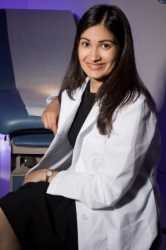08 Aug Shorter Courses of Radiation For Breast Cancer Found Safe and Effective with Fewer Side Effects
 MedicalResearch.com Interview with:
MedicalResearch.com Interview with:
Reshma Jagsi, MD, DPhil
Associate Professor and Deputy Chair
Department of Radiation Oncology
University of Michigan
Medical Research: What is the background for this study? What are the main findings?
Response: In recent years, there has been accumulating evidence from clinical trials that have supported the long-term safety and effectiveness of shorter courses of radiation therapy—“hypofractionated radiation therapy”—for patients with breast cancer. However, little has been known about the experiences of patients during treatment, especially when this new approach is administered outside the setting of closely controlled clinical trials. Our study examined the side effects and patient-reported experiences during radiation treatment of over 2000 breast cancer patients in the state of Michigan. It found that women who received hypofractionated treatment were less likely to report side effects (including skin reaction and fatigue) than patients treated with more traditional courses of radiation treatment, delivered daily over 5-6 weeks or longer.
Medical Research: What should clinicians and patients take away from your report?
Response: These findings encourage enthusiasm for this innovative approach. Our patients are busy women bravely coping with the stress of a new cancer diagnosis while balancing many other responsibilities; this study is important because it shows that a hypofractionated approach might help ease some of the challenges these women face during radiation treatment. Clinicians can now safely and effectively offer a much more convenient approach to radiation treatment for many women who undergo lumpectomy for breast cancer. We can also assure patients that hypofractionated courses are safe and effective, with important potential advantages in both the short and longer term, when compared to the way radiation has traditionally been delivered.
Medical Research: What recommendations do you have for future research as a result of this study?
Response: Future research should seek to to monitor uptake of hypofractionated whole breast radiation therapy to ensure that this evidence is appropriately being translated into practice. Future research should also seek to develop other innovative ways to reduce the burden, toxicity, and cost of cancer treatment for our patients.
Citation:
[wysija_form id=”5″]
MedicalResearch.com is not a forum for the exchange of personal medical information, advice or the promotion of self-destructive behavior (e.g., eating disorders, suicide). While you may freely discuss your troubles, you should not look to the Website for information or advice on such topics. Instead, we recommend that you talk in person with a trusted medical professional.
The information on MedicalResearch.com is provided for educational purposes only, and is in no way intended to diagnose, cure, or treat any medical or other condition. Always seek the advice of your physician or other qualified health and ask your doctor any questions you may have regarding a medical condition. In addition to all other limitations and disclaimers in this agreement, service provider and its third party providers disclaim any liability or loss in connection with the content provided on this website.
Reshma Jagsi, MD, DPhil (2015). Shorter Courses of Radiation For Breast Cancer Found Safe and Effective with Fewer Side Effects
Last Updated on August 8, 2015 by Marie Benz MD FAAD
